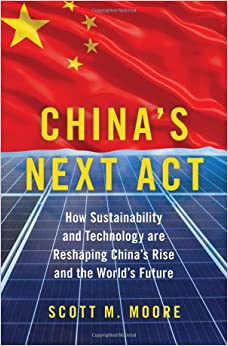Review of China’s Next Act: How Sustainability and Technology are Reshaping China’s Rise and the World’s Future by Scott Moore. Oxford, 2022.

America was once proclaimed to be the indispensable nation, without which no problem of consequence could be solved. Today, it and China are seemingly competing to be the intractable nation, core to both the causes of and potential solutions to global challenges such as climate change, yet stymied by systems that thwart ready resolution.
In China’s Next Act, Scott Moore, who is affiliated with the University of Pennsylvania, surveys the public health, environmental, science, and technology frontiers in search of opportunities for bilateral collaboration. Written with an admirable commitment to nuance, Moore nonetheless concludes that “if liberal societies fail to lead” in these areas, “the illiberal values Beijing increasingly relies on are more likely to hold sway.”
Just seven years ago, Moore reminds us, the PLA and US Army were working together in West Africa to stop the spread of Ebola; China had abandoned its “eco-veto” to endorse the Paris climate accords; and 14% of all US scientific papers were being authored by Chinese-born researchers. But in the intervening years, Beijing’s resurgent authoritarianism, protectionism, and nationalism has challenged a once promising outlook.
As practical collaboration has stalled, Moore holds out hope for agreements on norms, particularly in biotechnology, artificial intelligence, and data flows, which he believes can be advanced at a subnational level. He also rightly defends the value of continued exchange with China, particularly when its talent can be channeled through liberal institutions, such as American universities or corporations. Moore questions the most alarmist interpretations of China’s scientific prowess, instead calling out its strength in deploying new technologies at scale.
If bilateral collaboration were to resume, the preconditions Moore sets – that liberal societies be able to maintain a united front against inevitable pressure from Beijing, China has a demonstrable need, and the issue area can avoid politicization – can be better articulated. Collaboration should be welcomed when liberal societies are able to set high standards and can ensure the verifiability and enforceability of any agreement. If the benefits are compelling enough, China will sign on, as it now seeks to do with the CPTPP trade agreement.
Unexplored is the extent to which transnational health, environmental, and technological challenges have contributed to the reinforcement of China’s worst impulses. Climate change and COVID have granted the CCP new mandates for economic and social control while technology has afforded it powerful new means of enforcement.
Striking for a book nominally framed around global public goods is the paucity of attention to third countries. Failure to make progress on global health and environmental sustainability will fall hardest on the world’s poorest. And when many of the most vulnerable go on to seek refuge elsewhere, it will be Europe and the United States, not China, that will experience the greatest demand.
Excluding Indo-Chinese refugees from the 1970s that the UN considers to be de facto integrated, China’s refugee population numbers in just the several hundreds. (In 2021, 1.6 million refugees were living in the United States.) It is not just China’s doors that are closed, but its pocketbook too: the country contributed just $5.3 million to the UN Refugee Agency in 2021 compared with $1.8 billion by the United States.
The world should demand that China increase its responsibility for the human consequences of a failure to collaborate on transnational issues. It could be the best means of spurring the country’s leaders to more constructively engage.